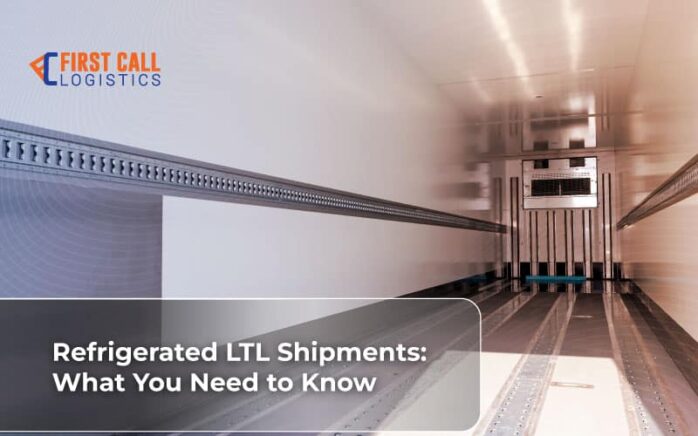Refrigerated LTL Shipments: What You Need to Know

There are some universal precautions taken across every industry to ensure shipped cargo arrives intact and unspoiled at its final destination. Safe packaging, clear labeling and strategic placement inside trailers can mitigate the risk of damage while in transit, while more sensitive cargo sometimes requires protection against changes in temperature.
Temperature-sensitive freight takes careful planning and equipment to ensure the cold chain remains unbroken from pickup to delivery. Even the slightest change in temperature can spoil an entire load — but what happens when businesses need to ship temperature-sensitive partial truckloads?
How Refrigerated LTL Shipping Works
A refrigerated truck, also known as a reefer, is specifically designed to maintain a controlled temperature inside the truck at all times. A built-in refrigeration system, insulated walls, thick door seals and reflective materials on the roof and sides help keep temperatures within the required range to maintain freshness and ensure the atmosphere inside the truck is unaffected by changing temperatures outside.
Anytime perishable goods are shipped using a reefer, it’s considered a refrigerated shipment. However, not all refrigerated shipments are large enough to fill an entire truckload themselves, which is where less-than-truckload (LTL) shipping comes in. LTL shipping allows companies to get products out the door more quickly since they don’t have to wait until they have a full load to ship.
Instead, an LTL carrier picks up their partial loads and delivers them to a regional hub or processing center, where the partial loads from many different companies are organized, sorted, and combined to create full truckloads, then shipped out to their final destinations.
Refrigerated LTL shipping saves companies money because they only pay for the space their freight occupies rather than for an entire refrigerated trailer themselves. Unlike dry LTL shipping, refrigerated LTL tends to have a more restricted pickup schedule to help the carrier move freight as efficiently as possible and reduce the chances of temperature exposure.
3 Challenges Refrigerated Shipments Face
The complexities associated with refrigerated shipping can be summarized by three main challenges:
- Time. Refrigerated shipments are perishable, which means they need to be delivered as soon as possible. However, demand for reefers is often higher than the supply, making these time constraints harder to manage.
- Cost. Because of the high-end equipment needed to maintain a controlled atmosphere while in transit and the skill required to operate it, the cost of shipping refrigerated freight is usually higher than dry shipments. Some of this cost can be recovered by shipping refrigerated LTL instead of full truckloads.
- Consolidation. LTL carriers make money by creating full truckloads out of partial shipments they’ve picked up from a variety of customers. Since refrigerated freight can vary greatly in its temperature requirements, they have to find enough customers shipping refrigerated freight at the same time and at similar temperatures to create a full load. This makes consolidated shipments difficult to arrange and schedule.
What Types of Products Are Shipped Using Refrigerated LTL?
A whole host of industries utilize temperature-controlled shipping to preserve product freshness:
- Food Industry – Everything you see in the refrigerated and frozen food aisles of your local grocery store has to be shipped using refrigerated shipping.
- Produce – Did you know the inside of a truck can be 30 degrees hotter than the outside? Produce has to be stored within a specific temperature range to avoid spoiling.
- Chemicals and Pharmaceuticals – Manufacturers and healthcare professionals have strict guidelines regarding the appropriate temperature for certain types of chemicals and pharmaceuticals.
- Floristry – Similar to produce, flowers are also plants, which means they’re just as susceptible to wilting and spoilage if exposed to sudden temperature changes or too much heat.
How Should You Choose a Refrigerated LTL Company?
Due to the complex nature of refrigerated shipments, not all LTL companies provide refrigerated shipping services, so it’s important to ask about this service before signing a contract. Also consider a potential partner’s years of experience in shipping refrigerated LTL — ask about current services, regulatory processes and typical loading and unloading practices. This will help you get a feel for whether they can meet your specific shipping needs.
Once you’ve found a good match, request a cost estimate and make sure you’re clear about how the LTL carrier calculates charges (material type, timeline, shipment frequency, volume per shipment, etc.) and what types of fees they include for things like packaging or labeling errors.
To learn more about reefers and refrigerated LTL shipments, contact one of our freight specialists or request a freight quote from First Call Logistics.
Simplify your Next Shipment with First Call Logistics
Building and managing cost-efficient supply chains is a full-time job. First Call’s rare combination of in-house assets, expert problem-solving and track record of stellar customer service makes us the 3PL of choice for business partners with a wide range of shipping needs.
More Resources for FCL Shippers:
- Article: Why Every Business Needs Efficient LTL Shipping
- Article: Understanding Partial Truckload and Volume LTL Shipping
- Article: Truckload vs. LTL, What’s the Difference?
- Article: An Introduction to Less Than Truckload (LTL) Freight
- Article: Effective LTL Freight Strategies
- Article: 3 Tips for Fresh Produce Transportation
Get the latest supply chain news and updates directly to your inbox.